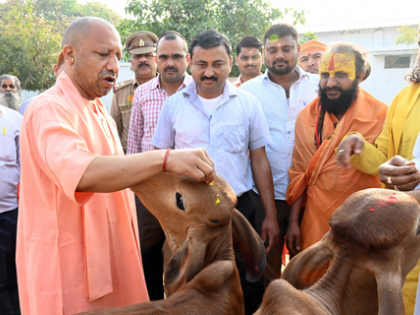From Panchgavya to biogas: UP’s new drive for sustainable rural development
By IANS | Updated: August 17, 2025 22:55 IST2025-08-17T22:46:21+5:302025-08-17T22:55:06+5:30
Lucknow, Aug 17 In a major initiative to boost Uttar Pradesh’s rural economy, the state Gau Seva Commission ...

From Panchgavya to biogas: UP’s new drive for sustainable rural development
Lucknow, Aug 17 In a major initiative to boost Uttar Pradesh’s rural economy, the state Gau Seva Commission has joined hands with Patanjali Yogpeeth to promote cow protection, Panchgavya products, natural farming, and biogas expansion across the state.
The Gau Seva Commission has inked a partnership with Patanjali Yogpeeth following discussions between Commission Chairman Shyam Bihari Gupta and Patanjali Co-Founder Acharya Balkrishna.
The unique move is in line with Chief Minister Yogi Adityanath’s vision and seeks to take forward his belief that the cow will form a key component of any village’s progress.
To advance this vision, Patanjali Yogpeeth has pledged full technical support to the state’s initiatives.
Under this partnership, cow shelters will no longer remain just centres of conservation, but will be transformed into hubs of rural industry, driving the production of Panchgavya products and biogas. Baba Ramdev is also expected to visit Uttar Pradesh soon to meet CM Yogi Adityanath and finalise the roadmap.
According to Dr Anurag Srivastava, OSD of the Gau Seva Commission, two to 10 cow shelters in each of the 75 districts will be developed as large model centres. Open sheds, fencing, and security arrangements will be created in cow sanctuaries to ensure the free movement of cows.
This initiative will also unlock large-scale rural employment, with villagers actively participating in cow urine collection and product sales under a 50 per cent commission model. Patanjali Yogpeeth will further support the programme through training, quality control, formulation, certification, and licensing.
In addition, advanced technologies such as geo-fencing, cow tagging, photo mapping, and fodder inventory tracking will be introduced in cow shelters. Natural inputs like neem, cow urine, and vermicompost will also be supplied to every village, helping farmers reduce costs, improve soil fertility, and strengthen environmental sustainability.
Disclaimer: This post has been auto-published from an agency feed without any modifications to the text and has not been reviewed by an editor
Open in app